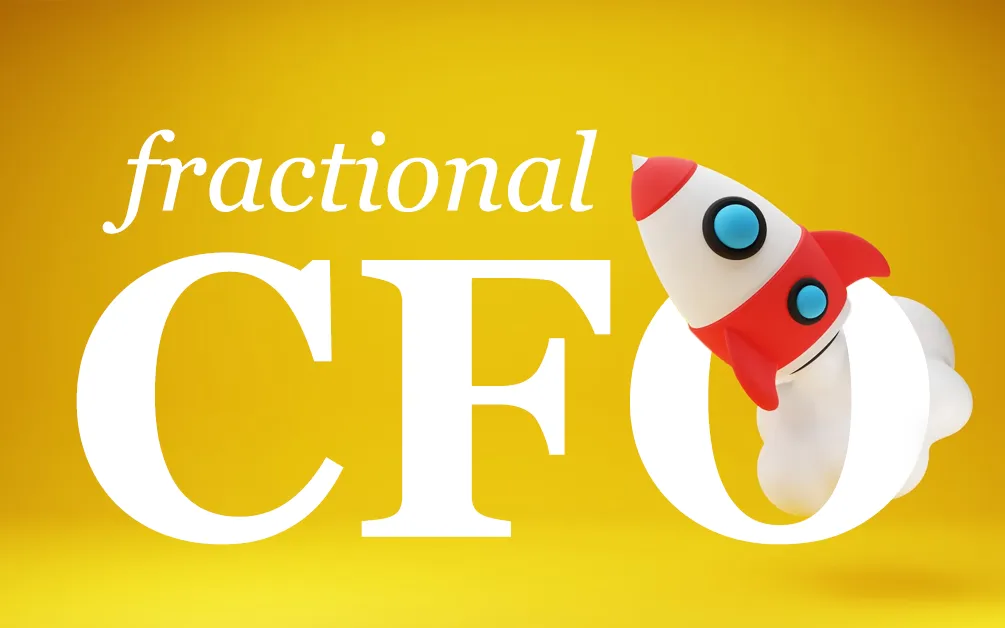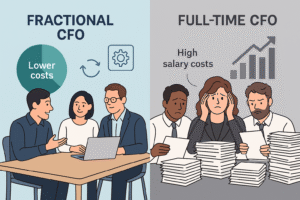In today’s dynamic business environment, every company — from startups to established enterprises — needs strong financial leadership. Yet, hiring a full-time Chief Financial Officer (CFO) can be expensive, especially for small to medium-sized businesses. That’s where the concept of a fractional CFO comes in. A fractional CFO is an experienced financial expert who provides strategic leadership and insight, but on a part-time or contract basis.
This arrangement allows companies to gain access to top-tier financial guidance without paying a full-time executive salary. However, one of the most common questions business owners ask is: How much does a fractional CFO cost to hire?
In this detailed guide, we’ll explore the various factors that influence fractional CFO pricing, how to budget for one, and why it may be one of the smartest financial decisions your company can make. To help you grasp the broader picture, we’ll also draw analogies from how financial principles — such as cryptocurrency concepts — work to create transparency, trust, and efficiency in modern finance.
What Is a Fractional CFO?

A fractional CFO is a part-time financial leader who works with multiple companies simultaneously, offering high-level financial expertise without the cost of a full-time hire. Think of them as the financial architect of your business — designing, forecasting, and managing the company’s financial structure while helping you make data-driven decisions.
They bring in-depth experience in areas such as strategic planning, cash flow optimization, mergers and acquisitions, risk management, and fundraising. Many growing businesses use fractional CFOs when they reach a stage where managing finances internally becomes too complex but cannot yet justify hiring a full-time executive.
In a way, the concept of a fractional CFO is similar to how what’s crypto functions in financial ecosystems — both provide flexibility, scalability, and transparency. Just as cryptocurrency decentralizes traditional banking and offers efficient, cost-effective solutions, fractional CFOs decentralize financial management by providing expertise on-demand, saving organizations from unnecessary overhead costs.
How Much Does a Fractional CFO Cost?
The cost of hiring a fractional CFO can vary widely depending on several key factors such as business size, industry, geographic location, and the complexity of financial operations. In the UK, the average annual cost is around £52,500, while in the United States, it can range from $5,000 to $15,000 per month depending on engagement type and experience.
Although this may seem like a significant investment, it’s far more affordable than the salary of a full-time CFO, which can exceed £108,000 annually — not including benefits, bonuses, and stock options.
In simple terms, fractional CFOs provide executive-level expertise at a fraction of the cost, allowing businesses to scale financial management without straining their budgets.
Just as crypto currency meaning represents value stored and transferred digitally without the need for intermediaries, fractional CFOs represent financial leadership delivered without the burden of full-time employment. Both models are efficient, adaptable, and built around accessibility.
Typical Pricing Structures for Fractional CFOs
Fractional CFOs use different pricing models depending on the company’s needs, engagement length, and level of service required. Understanding these pricing structures helps business owners choose the right arrangement for their situation.
Hourly Rate Model
In this structure, fractional CFOs charge an hourly fee for their services. This model suits businesses that need financial advice occasionally — perhaps to manage a short-term project, perform an audit, or assist with fundraising.
Hourly rates may vary depending on the professional’s expertise and location. Startups may prefer this model when they need targeted financial insights without committing to a long-term contract.
It’s comparable to explain cryptocurrency principles where users pay transaction fees only when they make transfers. Similarly, you pay your fractional CFO only for the hours you use, making this model flexible and cost-efficient.
Monthly Retainer Model
A monthly retainer involves paying a fixed amount each month for ongoing financial leadership. This model is ideal for companies that require consistent financial oversight but do not have the budget for a full-time CFO.
It allows business owners to have predictable costs and continuous access to financial guidance — from managing budgets to preparing reports and advising on growth strategies.
Retainers mirror how blockchain-based financial systems maintain continuous validation. In both cases, there’s ongoing support, stability, and accountability — qualities crucial for sustainable business growth.
Project-Based Model
When a business faces major transitions such as mergers, acquisitions, fundraising, or restructuring, a project-based engagement is often the best option. In this setup, the CFO provides strategic guidance for the specific project, with fees based on its scope and duration.
This model is popular among companies needing short-term, high-impact financial expertise. Much like crypto tokens serve specific project ecosystems in the digital finance world, a project-based CFO focuses entirely on delivering measurable financial outcomes within a defined timeframe.
Key Variables Affecting the Cost of Hiring a Fractional CFO
Several factors influence how much you’ll pay for a fractional CFO. Understanding these helps ensure you budget realistically and get the right fit for your business.
Complexity of the Business
A company’s size and structure play a big role in cost. Businesses with multiple departments, international operations, or complex revenue streams require deeper analysis and expertise, resulting in higher costs.
Scope of Services
The more comprehensive the financial support you require — from forecasting to board presentations — the more time your CFO will need to allocate. For instance, companies seeking investor relations or capital restructuring will pay more than those requiring routine reporting.
Level of Expertise
A CFO with decades of industry experience or specialized knowledge, such as fintech or SaaS, will naturally command higher rates.
Geographic Location
Location impacts cost significantly. A fractional CFO based in London or New York may charge more than one in smaller markets due to cost of living and demand differences.
Engagement Duration
Longer contracts often come with discounted rates. Retainers or recurring agreements tend to offer better value over time compared to one-off projects.
Comparing Costs: Fractional CFO vs Full-Time CFO

To understand the real value of a fractional CFO, it’s essential to compare it with a full-time CFO role.
A full-time CFO in the UK earns around £108,000 per year, excluding benefits such as bonuses, insurance, and pension contributions. Factoring in overhead expenses like office space, training, and equipment can easily raise the total annual cost to over £130,000.
On the other hand, a fractional CFO costs significantly less while offering comparable strategic expertise. Since they work on flexible contracts, you only pay for the hours or services used.
This is much like the crypto economy, where users don’t rely on centralized systems with high maintenance costs but instead benefit from decentralized, on-demand financial solutions. The fractional CFO model brings similar agility and cost-efficiency to the corporate world.
How to Budget for a Fractional CFO
Budgeting for a fractional CFO requires strategic planning and a clear understanding of your company’s financial goals. Here’s a step-by-step approach.
Evaluate Financial Goals
Identify what you want to achieve with professional financial support. Are you looking to improve profitability, secure investment, or restructure debt?
Determine the Level of Guidance Required
Assess your business complexity and determine how much time and expertise you need each month.
Assess Current Resources
Review your company’s cash flow, reserves, and existing financial systems. A fractional CFO can help identify inefficiencies and strengthen financial performance.
Review Cash Flow Management
If your business faces cash flow challenges, an experienced CFO can design forecasting models that ensure liquidity and stability.
Create a Detailed Budget
Once you’ve assessed your goals, align your financial resources accordingly. Include potential returns on investment, such as cost reductions, improved margins, and enhanced investor confidence.
Benefits of Hiring a Fractional CFO
The advantages of hiring a fractional CFO extend far beyond cost savings.
Strategic Financial Leadership
Fractional CFOs bring decades of experience and provide a clear roadmap for growth, helping businesses make informed decisions about expansion, funding, and investment.
Scalability
Businesses can increase or decrease hours as needed, ensuring flexibility in financial management.
Expert Insights Across Industries
Most fractional CFOs work with multiple clients, giving them exposure to diverse markets, trends, and strategies.
Cost-Effectiveness
You gain access to executive-level expertise without the ongoing expenses of a full-time executive.
Improved Decision-Making
Their analytical insights lead to better business decisions, particularly in forecasting and capital management.
Just as the principles behind explain cryptocurrency emphasize transparency and decentralization, fractional CFOs promote financial clarity and data-driven decision-making — empowering businesses to grow with confidence.
Also Read:
Tips for Choosing the Right Fractional CFO
- Look for experience relevant to your industry
- Assess communication and collaboration style
- Review previous case studies or success stories
- Ensure transparency in pricing and deliverables
- Align strategic goals and values with your CFO’s approach
Hiring the right CFO is about more than numbers; it’s about finding a partner who understands your business vision and can translate it into financial success.
Return on Investment (ROI) of Hiring a Fractional CFO
The ROI of a fractional CFO can be substantial. They help streamline cash flow, enhance profitability, improve compliance, and optimize financial reporting.
For example, many companies report cost savings from improved vendor negotiations, better tax planning, and reduced debt exposure. Moreover, their expertise in investor relations often helps secure capital more efficiently.
When seen through this lens, the cost of hiring a fractional CFO becomes a strategic investment rather than an expense. It’s similar to how crypto currency meaning redefined financial ecosystems — focusing on long-term decentralization, efficiency, and empowerment.
Conclusion
Hiring a fractional CFO gives businesses access to top-tier financial strategy and leadership at a fraction of the cost of a full-time executive. By understanding the different pricing structures, cost variables, and budgeting strategies, companies can make informed decisions that align with their growth goals.
Fractional CFOs not only provide cost savings but also strategic insight, helping businesses navigate uncertainty, secure funding, and achieve long-term profitability. In the same way that what’s crypto revolutionized finance through flexibility and security, fractional CFOs revolutionize financial management through scalability and expertise.
For businesses looking to strengthen their financial foundation, hiring a fractional CFO may be the most impactful step toward sustainable growth and financial stability.

